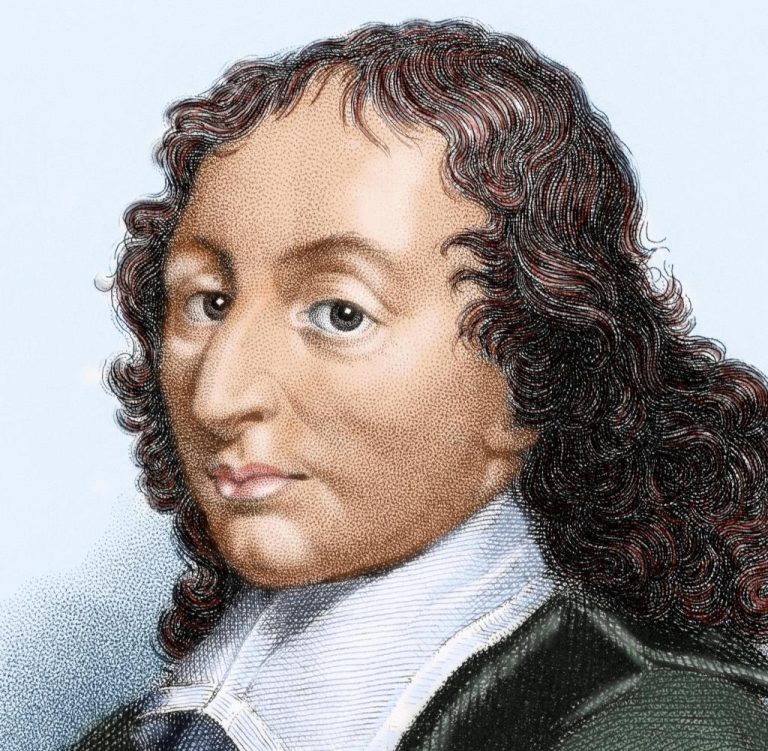Date of Birth: June 19, 1623
Zodiac Sign: Gemini
Date of Death: August 19, 1662
Biography
Blaise Pascal was a renowned French philosopher, mathematician, physicist, and inventor, born on June 19, 1623, in Clermont-Ferrand, France. He made significant contributions to the fields of mathematics and science, including the study of fluids, the concept of pressure and vacuum, and the development of probability theory. Pascal was also a prominent figure in the realm of philosophy and Christian theology, particularly noted for his work “Pensées,” a collection of fragments and reflections on religion and philosophy. Pascal’s early life was marked by his extraordinary intellectual abilities. His father, Étienne Pascal, was a local judge and a member of the tax court, who took charge of Blaise’s education. By the age of 16, Pascal had already made a name for himself with his work on projective geometry, which caught the attention of the mathematical community. In his 20s, Pascal invented one of the first mechanical calculators, known as the Pascaline, as a means to help his father with tax calculations. His work in mathematics extended to the development of what would later be known as Pascal’s Triangle and the foundational work in the theory of probabilities. Pascal also engaged in scientific experiments, most notably in the field of fluid mechanics, where he formulated Pascal’s Law, which states that pressure applied to a confined fluid is transmitted undiminished throughout the fluid. His work laid the groundwork for the study of hydrodynamics and hydrostatics. In his later years, Pascal experienced a profound religious conversion and became associated with the Jansenists, a Catholic reform movement. His philosophical and theological reflections are encapsulated in his unfinished work “Pensées,” where he famously proposed Pascal’s Wager, an argument advocating for belief in God as the most pragmatic choice. Blaise Pascal died on August 19, 1662, in Paris, France, at the age of 39. Despite his short life, his contributions have had a lasting impact on various fields of study.
5 Interesting Facts about Blaise Pascal
1. Blaise Pascal invented the Pascaline, an early mechanical calculator, at the age of 19.
2. Pascal’s Triangle, a triangular array of binomial coefficients, is named after him, although it was known to mathematicians in other cultures long before.
3. He formulated Pascal’s Law, which is fundamental in hydraulics and fluid mechanics.
4. Pascal’s Wager, found in his work “Pensées,” argues that it is rational to live as if God exists, even if the existence of God cannot be determined through reason.
5. He made significant contributions to the development of probability theory, which has applications ranging from gambling to statistics.
5 Most Interesting Quotes from Blaise Pascal
1. “The heart has its reasons of which reason knows nothing.”
2. “All of humanity’s problems stem from man’s inability to sit quietly in a room alone.”
3. “In faith, there is enough light for those who want to believe and enough shadows to blind those who don’t.”
4. “Man is but a reed, the most feeble thing in nature, but he is a thinking reed.”
5. “Truth is so obscure in these times, and falsehood so established, that unless we love the truth, we cannot know it.”
Highest Net Worth Achieved
There is no historical record of Blaise Pascal’s net worth, but his intellectual contributions have been invaluable.
Children
Blaise Pascal did not have any children.
Relevant Links
1. [Biography of Blaise Pascal on Britannica](https://www.britannica.com/biography/Blaise-Pascal
2. [Stanford Encyclopedia of Philosophy – Blaise Pascal](https://plato.stanford.edu/entries/pascal/
4. [Pascal’s Triangle and Its Applications](https://mathworld.wolfram.com/PascalsTriangle.html
5. [Pensées by Blaise Pascal – Project Gutenberg](https://www.gutenberg.org/ebooks/18269

